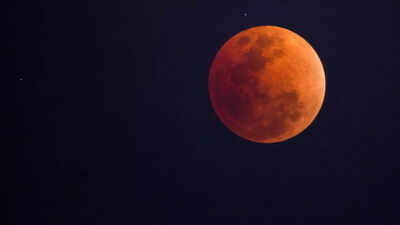ARTICLE AD BOX

On the night of September 7-8, 2025, India will witness a total lunar eclipse. For 82 minutes, the Moon will appear with a reddish glow, also called the Blood Moon. While the event is purely astronomical, it often stirs conversations about health, emotions, and cultural beliefs.
Here’s what science and tradition tell us about the health impacts of a Chandra Grahan.
No physical harm, only celestial beauty
A lunar eclipse occurs when Earth slips between the Sun and the Moon, casting its shadow across the lunar surface. Unlike solar eclipses, there is no risk to the eyes or the body when watching this event. It can be admired with the naked eye, without fear of radiation or physical harm. The Moon’s reddish glow is simply sunlight refracted through Earth’s atmosphere, not a health hazard.
The question of food safety
Traditional beliefs often warn against eating during an eclipse, suggesting that food loses its purity. Science tells a different story; food remains unchanged during the event. Nutrients are unaffected, and meals cooked or consumed under the eclipse carry no danger. This difference between cultural caution and scientific fact often sparks debate in households, but from a health perspective, there is no reason to alter dietary habits.

FILE - A total lunar eclipse, known as the blood moon, is visible between skyscrapers Friday, March 14, 2025, in downtown Chicago. (AP Photo/Kiichiro Sato, File)
Emotional ripples and sleep disturbance
While the body remains untouched, the mind can sometimes feel the pull of the eclipse. Studies suggest that heightened awareness of rare celestial events may lead to sleep disturbances, restlessness, or mood shifts. These effects are often psychological, shaped by anticipation and cultural narratives rather than physical influence. For some, the Blood Moon may feel mystical or unsettling, and that emotional weight can impact well-being in subtle ways.
Pregnant women and cultural cautions
Perhaps no group faces more eclipse-related taboos than expectant mothers. Traditions in many communities advise pregnant women to stay indoors, avoid sharp objects, or refrain from watching the eclipse. Scientifically, however, there is no evidence that a lunar eclipse harms pregnancy or the unborn child. For pregnant women, feeling safe and supported, whether by following tradition or embracing science, matters most.
The power of cultural stories

Image credit: Pexel
Beyond biology, the Chandra Grahan carries centuries of myth and folklore. Some traditions view it as a pause in cosmic energy, others as a reminder of balance between light and shadow. These stories, though not rooted in medical science, shape how people experience the event. Health, after all, is not only about the body; it is also about the mind and spirit. The eclipse becomes a shared cultural moment, where belief systems meet astronomical wonder.
Choosing calm over concern
The most practical approach during a lunar eclipse is to treat it as any other day. Eating well, staying hydrated, and resting are enough for health. If emotional unease arises, calming activities like journaling, meditating, or simply watching the Moon can bring grounding. The Chandra Grahan does not demand changes in lifestyle, it simply invites observation, reflection, and perhaps a moment of quiet awe.Disclaimer: This article explores the health impacts of a lunar eclipse based on scientific facts and cultural perspectives. It is not a substitute for medical advice. For any specific health concerns, consulting a healthcare professional is recommended.



.png)
.png)
.png)
















 8 hours ago
3
8 hours ago
3







 English (US) ·
English (US) ·